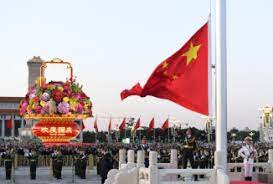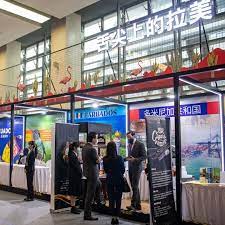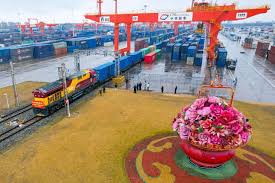China-LAC economic partnership thrives with expanding cooperation

Beijing: China and Latin American countries are embracing new cooperation opportunities as economic and trade relations develop vibrantly in sectors such as agriculture and infrastructure investment.
Government officials, heads of international organizations and entrepreneurs from both sides gathered in Beijing for a two-day conference to explore new growth avenues for enhanced trade and investment partnership between China and Latin America.
“The People’s Republic of China has been a consistent advocate for stronger ties with the countries of Latin America and the Caribbean,” said Dr. Mohamed Irfaan Ali, president of the Co-operative Republic of Guyana in a speech at the opening ceremony of the 16th China-Latin America and the Caribbean (LAC) Business Summit, which concluded on Friday.

The trade value between China and Latin America grew by 7.7 percent year on year to reach 485.7 billion U.S. dollars in 2022, reaffirming China’s steadfast position as Latin America’s second-largest trading partner, according to data from an earlier forum that involved private sectors from China and LAC countries.
LAC countries with vast market potential in infrastructure, green development and other sectors have propelled Chinese businesses to beef up investment in the region. As per data, the LAC region has become the second-largest destination for Chinese investment overseas.
LAC countries with abundant natural resources export numerous agricultural products ranging from corn and meat to coffee beans.
“China has been a fast-growing market for key coffee exporters in the LAC region and this trend was visible during the pandemic period as the demand for home-brewed coffee had seen a sharp increase,” said Wu Jiahang, chief representative for Greater China at the Colombian Coffee Growers Federation.
Wu added that the export volume of coffee and related products from Colombia to China reached about 11.64 million kilograms, with the total value hitting 81.22 million U.S. dollars last year.
Wu is of the belief that China’s market holds immense potential, especially considering that per capita coffee consumption in China remains significantly below the global average. He underscored that the increasing consumer demand for high-end coffee products is poised to be a driving force for the sustained growth of the Chinese coffee market.
China and LAC countries are complementary with each other as China boasts advantages in machinery and processing industries and the LAC countries have comparative advantages in the agricultural sector. Both sides have seen a deepening trade partnership, according to industry experts and business representatives attending the business summit.
The Beijing Capital Agribusiness & Foods Group has developed partnerships with a dozen of Latin American countries, with the value of foreign trade with these countries reaching nearly 20 billion yuan by now, according to Ma Jun, deputy general manager of the company.
“The growth trend of agricultural cooperation between China and Latin America in recent years is very sound, and the two sides should further open up their agricultural markets on the basis of grasping the complementary advantages of each other’s market resources,” said Song Jingwu, a researcher with the China Association for the Promotion of International Agricultural Cooperation.
Cooperation between China and LAC countries has extended from the agricultural sector to encompass infrastructure investments.
An increasing number of Chinese infrastructure companies, operating businesses such as power generation and transportation facilities, have entered Colombia to tap the market potential, said Carlos Ronderos, president of the board of directors of the Colombian-Chinese Chamber of Investment and Commerce. He said he expects more extensive investment efforts to be made by Chinese investors in the country.
With an aim to promote the operation efficiency of transportation and infrastructure facilities, Chinese businesses, including the ride-hailing company Didi and China’s NEV giant BYD, have launched cooperation initiatives with local governments in countries such as Brazil to increase the proportion of electric vehicles in the new car market as well as develop ride-hailing services provided through new energy cars.
Data from the Chinese customs showed that China’s foreign trade with LAC countries went up 5.1 percent in the first nine months of the year, higher than the country’s overall foreign trade growth.





